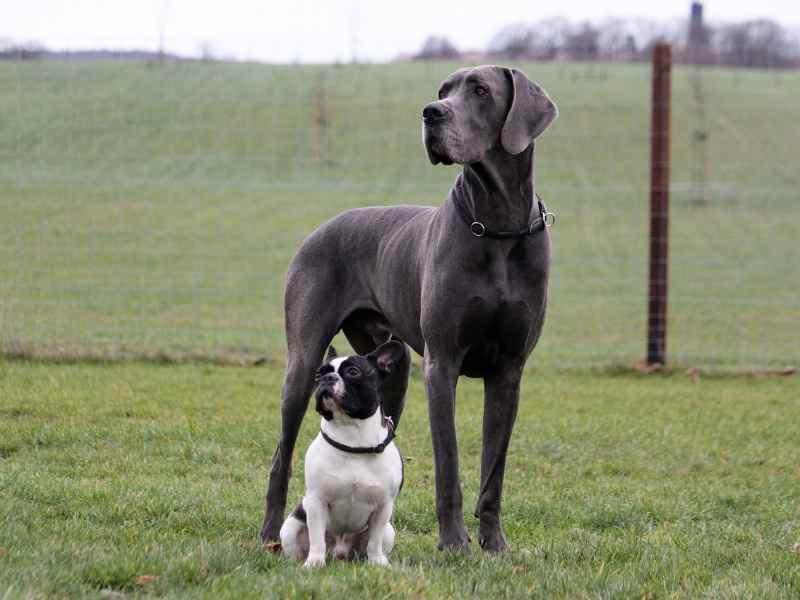Understanding Joint Health in Dogs

Before diving into breed-specific concerns, let’s understand just what we mean by joint health in dogs. Joints are complex structures where bones meet, allowing for movement and flexibility. A network of muscles, ligaments, and cartilage supports them. When any part of this system is compromised, it can lead to discomfort, decreased mobility, and long-term health issues. Healthy joints allow your dog to move around easily and purposefully, living their best life.
Universal Joint Health Concerns in Dogs
Specific joint issues can vary by size; we’ll discuss those later. Still, there are certain conditions that all dog breeds may face. It’s a good idea to understand some of those universal joint conditions in dogs.
Osteoarthritis: A Common Challenge
Osteoarthritis, also known as degenerative joint disease, is a common ailment in dogs of all sizes. It’s characterized by the gradual deterioration of cartilage in the joints, leading to pain and reduced mobility. A study in the Veterinary Journal highlighted that osteoarthritis is a major cause of chronic pain in dogs, affecting up to 20% of the adult dog population.
Cruciate Ligament Disease: Across the Board
Cruciate ligament disease, particularly tears or ruptures of what is the anterior cruciate ligament (ACL) in humans, is another condition that affects dogs regardless of their size. It can result from both acute injury and chronic degeneration. According to research, cruciate ligament disease is one of the most common orthopedic conditions in dogs, leading to secondary osteoarthritis if not properly treated. It’s super important to ensure proper recovery and rehabilitation after a tear as well.
Preventative Measures and Management
Maintaining a healthy weight for all breeds is crucial in preventing joint issues. Obesity can put additional strain on the joints, exacerbating conditions like osteoarthritis and cruciate ligament disease. VCA hospitals maintain that while previously, fat was considered relatively inactive tissue and just excess energy calories that added to body weight, new scientific evidence now suggests that fat tissue is biologically active. Findings show that fat secretes inflammatory hormones and creates oxidative stress on your dog’s body tissue, which can contribute to many diseases that don’t just affect dog joints. Thinking of obesity as a chronic, low-level inflammatory condition is more in line with current research that strongly shows why keeping dogs at a healthy weight makes a difference in the lives of so many dogs. Regular, appropriate exercise is key in maintaining joint health. It helps strengthen the muscles that support the joints, keeping them more stable. Supplementation with joint health-promoting ingredients also plays a crucial role, but it’s important that you pay attention to what you’re supplementing. Popular ingredients like glucosamine and chondroitin are often go-tos, but they’re not supported by enough science to rely on. Newer, more current research actually suggests there are better, more effective nutritional supplements for dogs when it comes to joint health.
Small Breeds: Compact Companions with Unique Needs
Small breed dogs, such as Dachshunds and Pomeranians, might be less prone to some of the more severe joint issues we see in larger dogs, but they are not wholly immune to joint health concerns. For example, Patellar Luxation, where the kneecap dislocates, is commonly seen in many smaller breeds. Some of the most common small-breed joint health issues are as follows:
- Dachshund
- Intervertebral Disc Disease (IVDD)
- Patellar Luxation
- Chihuahua
- Patellar Luxation
- Hip Dysplasia
- Pomeranian
- Patellar Luxation
- Legg-Calve-Perthes Disease
- Shih Tzu
- Hip Dysplasia
- Patellar Luxation
- Yorkshire Terrier
- Legg-Calve-Perthes Disease
- Patellar Luxation
- Pekingese
- Intervertebral Disc Disease (IVDD)
- Hip Dysplasia
- French Bulldog
- Hip Dysplasia
- Intervertebral Disc Disease (IVDD)
- Miniature Pinscher
- Patellar Luxation
- Legg-Calve-Perthes Disease
- Boston Terrier
- Patellar Luxation
- Elbow Dysplasia
- Maltese
- Patellar Luxation
- Hip Dysplasia
- Prevention and Care for small-breed dogs: Regular exercise, maintaining a healthy weight, and a balanced diet are key. Supplements that help promote joint and gut health work together for the best overall health.
Medium Breeds: The In-Betweens
Medium-sized breeds like Beagles and Bulldogs are part of that lovable middle ground, but their joint health needs are just as important. These breeds can be prone to conditions such as Hip Dysplasia, a developmental disorder leading to arthritis and pain. Some common medium-breed dogs and their joint concerns are as follows:
- Labrador Retriever
- Hip Dysplasia
- Elbow Dysplasia
- Golden Retriever
- Hip Dysplasia
- Elbow Dysplasia
- Boxer
- Hip Dysplasia
- Arthritis
- Bulldog
- Hip Dysplasia
- Elbow Dysplasia
- Beagle
- Intervertebral Disc Disease (IVDD)
- Hip Dysplasia
- Australian Shepherd
- Hip Dysplasia
- Elbow Dysplasia
- Cocker Spaniel
- Patellar Luxation
- Hip Dysplasia
- Border Collie
- Hip Dysplasia
- Basset Hound
- Intervertebral Disc Disease (IVDD)
- Elbow Dysplasia
- Dalmatian
- Hip Dysplasia
Management Tips for Medium-sized breeds: Regular vet checkups, regular exercise, healthy weights, and good supplementation maximize joint health for this group.
Large Breeds: Gentle Giants with Big Concerns
Lovable large and giant breeds, like German Shepherds and Mastiffs, are particularly susceptible to joint issues due to their size and weight. Conditions such as Osteoarthritis and Elbow Dysplasia are common and can significantly impact their quality of life. Some popular large breed dogs and joint concerns they have include:
- German Shepherd
- Great Dane
- Hip Dysplasia
- Osteoarthritis
- Rottweiler
- Hip Dysplasia
- Elbow Dysplasia
- Doberman Pinscher
- Hip Dysplasia
- Cervical Vertebral Instability (Wobbler Syndrome)
- Saint Bernard
- Hip Dysplasia
- Elbow Dysplasia
- Mastiff
- Hip Dysplasia
- Elbow Dysplasia
- Bernese Mountain Dog
- Hip Dysplasia
- Elbow Dysplasia
- Newfoundland
- Hip Dysplasia
- Irish Wolfhound
- Hip Dysplasia
- Osteosarcoma
- Alaskan Malamute
- Hip Dysplasia
- Chondrodysplasia
Caring for Large Breed Joints: Along with regular vet check-ups, it is vital to incorporate low-impact exercises and ensure they don’t overexert themselves. Nutrition plays a significant role in maintaining joint health, focusing on foods and supplements that support bone and joint health. Weight management is critical to reduce stress on the joints. Regular, gentle exercise helps maintain muscle strength, and orthopedic beds can provide extra support and comfort. Supplementing joint health early on can make a tremendous difference for them, especially as they age, as senior large-breed dogs may struggle even more with joint health issues.
Bernie’s Best: No Matter The Breed, We’ve Got You Covered!

We’re dog lovers, just like you, and we know joint issues can be a big deal, especially for the big pups (like our Bernie and Lady). We found that the old-guard supplements like chondroitin and glucosamine had just had their day. There needed to be more science, and it needed to be updated, for us to go with what was ‘popular’, so we did our own research and came up with a fresh approach that focused on what modern science says is best for our pups. We started with our own big dogs and we knew they needed more than just joint support—they needed all-round champions for their health. We rolled up our sleeves and got to work on finding the best not just for joint health but overall health too. We’re talking about ingredients like omega-3s straight from flaxseed, anchovy, and algal oil. These aren’t just good for creaky joints; they’re brain food, coat glossers, and immune system warriors. And antioxidants? We know how important those are, too. Astaxanthin and blueberries to help fight off the bad stuff that can slow a dog down. Plus, we spiced things up—literally—with turmeric and a dash of green tea extract to keep inflammation in check. It’s what works–and not just for our dogs. It can make a difference for yours, too. Every scoop of Bernie’s Best is packed with care and science to make sure that when your dog leaps for that frisbee or curls up for a nap, they’re doing it with the best health science and nature can offer. At the end of the day, no matter the breed size, it’s all about giving our dogs the good life they deserve, and we’re privileged to be part of the story!





